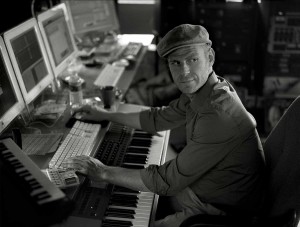
On a first viewing of a film, Holkenborg does not watch from a professional standpoint in terms of what he should be composing. Rather, he just enjoys the film, walks away, and takes a day or two to process what he saw and felt. His next step is to figure out how to transfer that experience into music.
After a screening of Black Mass about six weeks before the final dub, he told director Scott Cooper, “I’d love to write something for you that I feel is the spine of the movie. I’ll send it to you and if you recognize your movie in there, I would love to do this together with you. I got a little out of control and came in with this 45-minute thing. He was blown away by it and we started working together.”

“Putting that together was pretty quick,” said Holkenborg. “After that I started experimenting with sound design derived from piano and strings to give this really eerie sound quality throughout the film that we used for the characters. That’s basically where I started.”
Holkenborg had previously worked with Black Mass sound designer Mark Mangini on Mad Max: Fury Road. Because movie music and sound disciplines overlap more and more into each other’s traditional areas, the composer and sound designer talked extensively about working together at an earlier stage to better collaborate on the soundtrack.
 “It’s very good to team up beforehand and discuss what you’re trying to do and what they’re trying to do,” explained Holkenborg. “We exchanged files in the process.”
“It’s very good to team up beforehand and discuss what you’re trying to do and what they’re trying to do,” explained Holkenborg. “We exchanged files in the process.”
Black Mass, which tells the true story of hit man Whitey Bulger, is an extremely dark movie. The score covered a complex emotional range – suspense, foreboding, even hopefulness. When deciding on musical techniques, Holkenborg looked back at the great scores from the past for inspiration. The music could underscore the emotions in some scenes, play against the emotion in others, and in some cases a scene could be played without any music at all.
“Do we really rub it into the audience or do we use restraint. Restraint was something that Scott really wanted. If we do use music, it needs to be restrained,” revealed Holkenborg. “And very important… do we counter or do we play with it.”
 Sometimes when Bulger takes out another person, such as the slow, brutal murder of the DEA agent, Holkenborg scores what is being seen on screen. However, when Deborah Hussey (Juno Temple) is killed by Bulger, Holkenborg counter-plays against the screen action by focusing on the emotional impact the act has on Flemmi (Rory Cochrane).
Sometimes when Bulger takes out another person, such as the slow, brutal murder of the DEA agent, Holkenborg scores what is being seen on screen. However, when Deborah Hussey (Juno Temple) is killed by Bulger, Holkenborg counter-plays against the screen action by focusing on the emotional impact the act has on Flemmi (Rory Cochrane).
“We get sucked into his head where he starts feeling enough is enough already,” explained Holkenborg. “That’s also the scene after Bulger gets in such a paranoia state that he separates himself from the pack. The music gets more and more emotional because all these people are basically left behind with a huge amount of jail time, and it’s more-or-less the emotional fallout of what this person had done in his life.”
An important rule that the director gave the composer was to make these people human, no matter how horrific their actions were. Once it was understood that these were people who were capable of doing terrible things, then that side could be scored.





